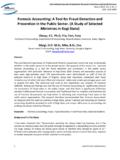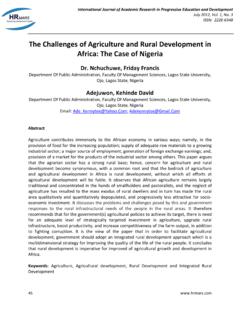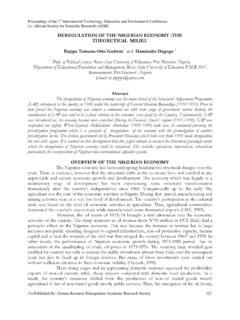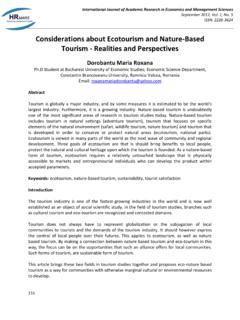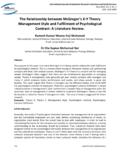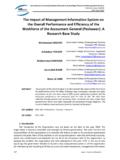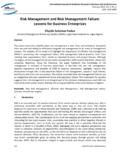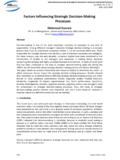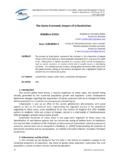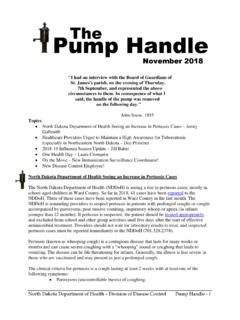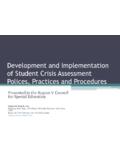Transcription of The Role of the School Principal in the …
1 International Journal of Academic Research in Progressive Education and Development July 2012, Vol. 1, No. 3 ISSN: 2226-6348 125 The Role of the School Principal in the implementation of the Free Secondary Education Emily Jepkoech Rotich School of Education, Department of Educational Management and Policy Studies, Moi University Lydia Cheruto Kipkoech Examinations Department, Moi University E-mail: Abstract This study investigated the role of head teachers effectiveness in the implementation of free secondary education in Keiyo District, Kenya. The study was a descriptive research that examined the situation as it was on the ground without any manipulation of variables. The target population of the study comprised a total of 37 secondary schools that present candidates for KCSE in Keiyo district. Keiyo District was chosen in this study because it is one of the districts with a high poverty index and therefore, likely to benefit more from the FSE policy.
2 The sample consisted of 25 secondary schools drawn through stratified random sampling technique. The instruments for data collection were: self-administered questionnaires, interview schedule and document analysis. The study established that the FSE was introduced in haste hence the head teachers were not prepared before FSE implementation . Overall management of the School had improved although the FSE programme still experienced some teething problems that included: late disbursement of funds by government, inadequate funds to cater for the entire vote heads, misconception by parents that FSE policy catered for all the fees and fluctuation of market prices of commodities. The study recommendations include the need to avail the free education funds to the schools at the beginning of the year. Keywords: Education, Free, Head Teachers, Kenya, Secondary, Policy Introduction Education is fundamental in the development of human persons and has been viewed principally in light of a fundamental human right (Kyalo et al.)
3 , 2006). Due to Kenyan government s desire to achieve the Millennium Development Goals, there was need to invest more in education, the hence the implementation of Free Secondary Education (FSE) in 2008 also as a response to upsurge of students from primary schools due to the implementation of Free Primary Education (FPE) in January 2003 (Malenya, 2008; Orando, 2009). The government waived tuition fees as it constituted a significant proportion of the finances required in meeting the cost of secondary School education which was a reprieve to parents, guardians and sponsors (Malenya, 2008). International Journal of Academic Research in Progressive Education and Development July 2012, Vol. 1, No. 3 ISSN: 2226-6348 126 Each student was entitled to a provision of Kshs, 10,265/= per year to cover tuition, administrative costs, repairs, maintenance, improvement, local travel and transport, electricity/water and conservancy, activity, personal emolument and medical.
4 On the other hand, parents only paid boarding costs to a maximum of Kshs, 18,265/=per annum (for students in boarding schools)-IPS News Africa in Juma (2009). The haphazard manner in which the programme was implemented after political campaign promises of 2007 and lack of policy paper in the enactment of the FSE programme clearly suggests that there was little research done before the implementation of the programme. Given the political circumstances out of which the FSE policy appears to have been concerned with, the policy was received with mixed feelings and reactions. For instance, critics have seen the policy, as a populist move that will in real terms, be a burden to parents. There have been arguments such as: Free Secondary Education will occasion an influx that will certainly strain the existing physical facilities and human resources; triggering schools to slap building and expansion levies on parents, as the government taxes citizens more to raise tuition for the bulging number of students and pay more teachers (Otieno, 2007).
5 Thus management of the schools was affected by this sudden development. According to the New Policy of FSE; the Government pays , 265 per student annually as tuition fees (MOE, 2009). This leaves day-scholars with only uniforms, building and activity fees to pay. Their boarding counterparts, however, pay a maximum of , 265/= to meet the extra requirements (Kimani, 2008). There were conflicts that were reported in some schools resulting from lack of proper education of the public on the implications of Free Secondary Education Policy. The plan which was introduced in the year 2008 has been experiencing problems such as: the delay in disbursement of the funds to schools, high student enrolments, and lack of adequate classrooms, congestion, and lack of teachers, facilities and quality education compromised. Success in implementing FSE is possible when it is done with excellent skills to achieve expected School performance.
6 Carron et al. (2005) assert that the secondary schools major task in improving School academic performance is to provide sound School leadership after major policy changes. Fry and O Neill (2002) note: We know that if we can have a dramatic impact on raising the quality of School performance, we will have a dramatic improvement in student achievement across the board. Management Practices In Schools Management is the process of working with and through others to achieve organizational objectives in a changing environment. Franklin (2002) defines management as a distinct process consisting of activities of planning, organizing actuating and controlling performed to determine and accomplished stated objectives with the use of human beings and other resources. While Management is a system or structure, teacher empowerment represents an internal perception of having increased authority in their positions.
7 Another closely related concept, teacher International Journal of Academic Research in Progressive Education and Development July 2012, Vol. 1, No. 3 ISSN: 2226-6348 127 leadership, includes teacher participation in management as part of a broader leadership role both within and outside of the classroom. The works of Rosenburg and Holand (1990) and Crowther (2002), describe in detail an image of teacher leadership as full participation by teachers in developing a shared vision, planning and implementing instructional improvements, working with the community, and participating in professional development in job-embedded, collegial ways, in addition to participation in management. A more narrowly defined concept is shared governance, a term used by Blas and Blas (2000). Shared governance refers to head teachers sharing their governing roles with teachers. It is very similar to participative management, in which teachers participate, in various ways and to varying extents, in making decisions in schools that were traditionally made by the head teacher.
8 However, shared governance encompasses other governance or leadership roles that are distinct from management, including peer supervision or evaluation, action research and School data analysis, and leadership in such areas as staff development and personnel hiring (Blase and Blase, 2000). A related term, participative management, refers to the management strategy of head teachers that leads to teacher participation. An effective and efficient manager must possess the technical, human and conceptual skills in order to be a good (Franklin, 2002). As highlighted by the author noted, the technical knowledge and skill include understanding and being proficient in using specific activity such as a process, technique or procedure. The School managers must be equipped with the knowledge and skill to perform administrative duties in the School .
9 This will include planning the daily routine among other duties In a learning institution; a head teacher should develop a good interpersonal relationship with the teachers, support staff, committee and with the community in order to avoid resistance to any change that he or she introduces and to ensure success in meeting their objectives. Kreither (2000) supports this view when he says that a manager experienced a number of interpersonal problems; among other things they were perceived as manipulative, abusive, untrustworthy, demeaning, overly critical not team players, and poor communication . School managers should be equipped with the management skills and techniques such as management by objectives. This is because management is concerned with the conversion of diverse resources among them people, machine, materials, money and time into a useful enterprise.
10 The success in the achievement of goals will depend on how effective and efficient the physical and human resources are utilized and how the existing the aims and objectives of the enterprise. Financial support of the secondary School by the government does not mean that schools will be without trouble. There are uncontrolled and unforeseen circumstances that make it difficult for services to be delivered effectively. The School managers should be well versed with procurement procedures and financial management so as to ensure that the finances given to them are properly accounted for. This is necessary because an enterprise can remain effective only when there is proper direction and control of its day-to-day activities. The School manager International Journal of Academic Research in Progressive Education and Development July 2012, Vol. 1, No. 3 ISSN: 2226-6348 128 is entrusted with the shaping of the attitudes, behavior and imparting skills to the students hence shape the destiny of the nation.
